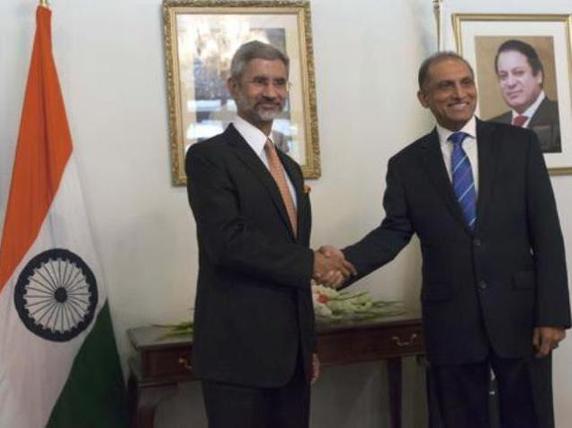Pakistan-India relations need a healing touch
- By Sajjad Malik
 0 Comment(s)
0 Comment(s) Print
Print E-mail China.org.cn, April 29, 2016
E-mail China.org.cn, April 29, 2016
|
|
|
Pakistan's Foreign Secretary Aizaz Ahmad Chaudhry (right) shakes hands with his Indian counterpart S.Jaishankar before their meeting at the Foreign Ministry in Islamabad in March 3, 2015. |
After weeks of futile brinkmanship, the foreign secretaries of Pakistan and India met on April 26 in New Delhi on the sidelines of the Heart of Asia conference. They exchanged warm handshakes, followed by photo-ops, grim smiles and heady exchanges of usual allegations. The session ended without any agreement to revive a stalled peace process, dashing hopes of millions of people in both countries who want peaceful ties based on the simple principle of co-existence.
As there was no formal joint communiqué at the end of the talks, the two sides quickly resorted to social media to offer "glimpses" of the discussion. The selective stuff dished out to the media was an effort to cater to domestic elements, which are ever hungry to feed on anything antagonistic for bilateral relations.
The pattern of India-Pakistan meetings has become predictable. The two countries often waste months (and sometimes years) in posturing and then suddenly a major activity is announced out of blue. Serious preparations for peace are seldom made, while officials spend time repeating the same set of age-old allegations against each other. The media outlets in the two countries carry the same stories, which have been going in the press for decades. After formal interactions, a new chill creeps into the relationship.
The best example of this off-the-cuff diplomacy was the visit of military leader Pervez Musharraf who dashed to New Delhi in July of 2001 with the hope of creating history. It was the most hyped visit in the history of the two countries. The kind of media coverage Musharraf received was unparalleled. His every move was captured and printed. But the purpose of the visit failed. After two-days of hectic talks in the historic city of Agra, Musharraf flew back empty handed. The visit failed primarily due to a lack of a properly defined agenda and options to disentangle the heated disputes.
In the very near past, the Indian Prime Minister Narendra Modi announced on the fine morning of December 25, 2015 that he planned to land in the Pakistani city of Lahore to meet with Prime Minister Nawaz Sharif. The purpose was to create goodwill and possibly pave the way for the beginningof formal talks. Since the visit was sudden and without any proper homework, it failed to achieve solid results, and its impact was washed away by the terrorist attack at India's Pathankotair base on January 3.
The latest meeting between the foreign secretaries was overdue since January 15, when the Indian foreign secretary was supposed to visit Pakistan for a formal meeting to start the Comprehensive Dialogue Process which was agreed between the two sides in December when the Indian foreign minister visited Pakistan to attend the Heart of Asia conference.
The dialogue failed to progress due to the airbase attack. Later on, the atmosphere was further vitiated when Pakistan announced that it arrested an Indian spy who was involved in supporting militancy and creating instability. In fact, the two issues, an airbase attack and the capturing of a spy, apparently dominated the meeting between foreign secretaries in New Delhi.
Several other issues can be mentioned which are sources of tension between the two neighbors. To my mind, the real problem is a lack of trust and the existence of dominant rival narratives regarding each country's intentions. Pakistan was created by the partitioning of India in 1947. Hundreds and thousands of people were killed and millions more migrated when the Hindu and Muslim populations exchanged sides to settle either in Pakistan or India. The bloody events set the tone for the future ties. It has been roughly seven decades, but the bloodbath is still being used to whip up sentiment.
Various efforts have been made in the past for sobering relations, but they lacked a healing touch and enthusiasm for better relations. Instead of chalking out a peaceful future for the coming generation, these occasional officials' meetings are wasted by highlighting previous grievances. The rivalry is institutionalized and supported by influential individuals, religious groups, political parties and security establishments. In fact, some groups thrive on the prevailing atmosphere of mistrust and enmity, and try to perpetuate it.
The two sides have conveniently forgotten that the current state of relations hardly fits into the vision of their respective founding fathers.
Sajjad Malik is a columnist with China.org.cn. For more information please visit:
http://www.china.org.cn/opinion/SajjadMalik.htm
Opinion articles reflect the views of their authors, not necessarily those of China.org.cn.







Go to Forum >>0 Comment(s)